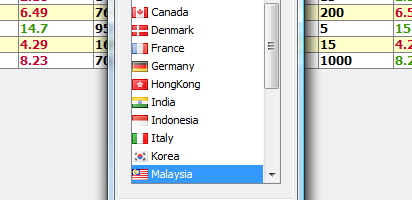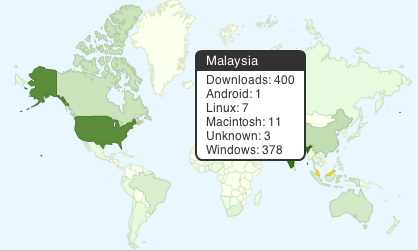 Rich: SourceForge is pleased to announce the December 2012 Project of the Month.
Rich: SourceForge is pleased to announce the December 2012 Project of the Month.
![]() JStock is free stock market software. Its intent is to help you invest intelligently, and have fun while you’re doing it. I recently had the pleasure of speaking with Yan Chen Cheok, who is the lead developer on this project. He told me some things about the history leading up to JStock becoming Open Source, and also a little bit about the project itself.
JStock is free stock market software. Its intent is to help you invest intelligently, and have fun while you’re doing it. I recently had the pleasure of speaking with Yan Chen Cheok, who is the lead developer on this project. He told me some things about the history leading up to JStock becoming Open Source, and also a little bit about the project itself.
If the embedded audio player below doesn’t work for you, you can download the audio in mp3 or ogg formats.
You can subscribe to this, and future podcasts, in iTunes or elsewhere, at http://feeds.feedburner.com/sourceforge/podcasts, and it’s also listed in the iTunes store.
Rich: Congratulations on the project of the month!
Yan: Oh, thank you very much. I’m really happy about that.
Rich: Let’s talk a little bit about the project. Tell us what JStock does.
Yan: It’s a stock market software, where the object is to make your stock investment fun and easy. The reason we make this software is we want to make the stock investing activity an easy process even for the beginner to the stock market.
Rich: How many of you are involved in this project?
Yan Currently I’m the only main developer. But from time to time I will receive some code contributions from my users – they do some language translation for me, or they see some bug in the bug tracker and they send me code patches, and so on. From time to time I will receive some code patches from them, but most of the time I’m still the only developer fro this project.
Rich: You received a lot of votes for the project of the month, so I take it you have a lot of happy and content users. Where do you think most of your users are in the world?
Yan: Currently most of my users are in Malaysia, because I’m Malaysian myself. Because when I first created this project, I did a lot of marketing and promotion among my own investment community – I tried to talk to them, I tried to introduce this software to them. So this spread from mouth to mouth, so it ended up my users are pretty concentrated in a certain geographic location. I also tried to promote this overseas, like in the United States, but it didn’t work so well because I don’t know much of the investing community out there. I’m only familiar with the community around me.
Rich: Why did you choose to make the software open source?
Yan: I think this needs to go back a few years ago. When I started this project initially, I did not intend to make it Open Source. I started the project because at UCLA I got a contract software project from the stock industry. They wanted someone to create a customized software project for their stock education center. After I finished the software, they refused to pay for the project.
Rich: Oh no!
Yan: Yeah, that’s not a good thing. At first I was quite upset with that because I spent so much effort and time into finishing the project, and I’m not getting paid. Then I was thinking, instead of throwing away the source code, or just letting this software die, why don’t I open source it, and make it grow. If I look back in my code committing history, I see … I think that happened around 2007, August. So I think that’s the time when it got started. It began from a failed software contract project, and I grew it to become an Open Source project with the help of SourceForge.
Rich: That’s a good story. It could have gone much worse.
Yan: I think it’s a good thing, though. If I sold it to them, maybe I’d only get a few hundred users, but now I made it Open Source, and published it on SourceForge, the world-wide users also can enjoy this software. It’s quite a satisfaction for this.
Rich: Again, thank you very much for speaking with me, and congratulations on winning project of the month.
Yan: Oh, thanks.
Rich: If people want to get involved in your project, should they get in touch with you, or should they talk on the forums, or what?
Yan: In our project website, within the wiki, I describe how the code contribution process should go on. So basically they just need to go through any feature request or bug report in the tracker, they can pick up the ticket, then email me a code patch. So, if they do that process several times, then I will give them commit rights. But so far most of the time I only receive only one-time contributions from the contributors, so I still am not able to make them a long-time committer for the project.
Rich: Thank you very much. I wish the best on your project!

